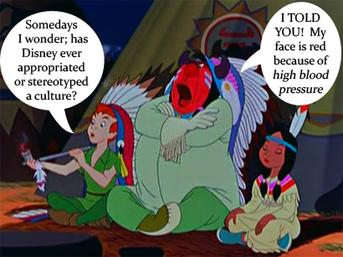
Even though I am a Disney fan, I think it has been a long time since I put down my rose-colored glasses. However, Disney's role in my life hasn't diminished one bit. I still sing along to the classic movies' songs, get excited for new movies, and I still watch the classics.
Mickey Mouse Monopoly is a documentary that tries to show that Disney is not as pure, as it appears. After watching it, I have to agree that Disney holds a lot of pull in what our kids think, want and how they behave, but also in popular culture, in general. Like they mentioned, the Walt Disney Corporation (not the Walt Disney Animation Studios) own ABC, ABC Family, Disney Channel, Disney Junior, Disney XD, ESPN, Lifetime (and all of its movie channels), among other things. So they do have a lot of say in what we and our kids watch.
Disney has had problems with how they represent certain parts of society, specifically minorities, which is something that is not uncommon in the world of media. It's wrong, but it happens. I have to be honest most of the things people point out as demeaning or racist went over my head when I was a kid. When I was older, I noticed how Native Americans were portrayed in Peter Pan. The crows in Dumbo, however, I thought they were from the South--not that they were African-Americans, but I do concede on this one. Then, there are the hyenas from The Lion King. I think it's a stretch to think they represent African-Americans. Why? Well, I only saw an African-American woman (Whoopi Goldberg), a Latin American man (Cheech Marin) and an American man (Jim Cummings) voicing the hyenas--not a stereotype like in Peter Pan or in Dumbo. As you can see, not all of the actors are part of minorities, and the ones that are part of them are not part of the same one.
I do not mind analyzing Disney critically, so watching a documentary saying that there are racist undertones in the characterization of minorities in their films is not something that fazes me. However, I did not like that the documentary skimps out on some things. Regarding Latino representation, although I'm pretty sure people want more (including myself), up until 2001 there were three Disney movies that either took place in Latin America or talked about Latin American culture. These were: Saludos Amigos, The Three Caballeros and The Emperor's New Groove. In The Three Caballeros, Donald Duck learns about Latin American culture and the species of birds that live there through birthday presents he opens throughout the movie, and he meets two friends--Panchito, the rooster (from Mexico) and José (from Brazil). This film, the 6th Walt Disney animated feature, stunned a lot of people because it didn't show a downtrodden Latin America, instead it showed its modern cities. Also on 2001, Disney released Atlantis: The Lost Empire, which featured along its characters a doctor of African-American and Native American descent, as well as a Puerto Rican teenage girl as a mechanic. Granted, this documentary came out in 2001, so there was no time to add these characters or for kids to know them either. The point is that, although Latino representation is scarce, it's not all Chihuahua related.
Regarding African-American representation, I would add Uncle Remus from Song of the South (1946), an animated/live-action movie, but that would be poking a bear with a stick. What we need to know is that there was an African-American former slave who told stories about Br'er Rabbit and Br'er Fox, among other animals, to a little boy. The animated part of this movie inspired the ride Splash Mountain in Magic Kingdom and Disneyland, which features the Academy Award winning song, Zip-a-Dee-Doo-Dah. The problem with this movie is that people didn't like the portrayal of former slaves in the live-action part of it, and it is deemed as racist, due to its unclear timeline in history, since there's no clear indication that the movie takes place either before or after the Civil War. From what I've read, what irritated a lot of people was that Disney was trying to be ambiguous about their stance on segregation and civil rights, and it ended up backfiring. I haven't seen it, as a whole, because Disney hasn't re-released it--I've only seen the animated parts of it and Uncle Remus singing Zip-a-Dee-Doo-Dah--so I can't redeem it or condemn it.
I would also like to point out that there are plenty of voice actors who are African-American who were not cast in a racially demeaning role or portrayed offensively. For example, Mufasa was voiced by James Earl Jones, one of the greatest actors ever. Other examples are: Sarabi, young Nala and Rafiki from The Lion King; Rita, Francis and Roscoe from Oliver & Company; Mushu from Mulan; four dinosaurs from Dinosaur (I will not mention them because I'm pretty sure almost no one will recognize them). As a note, all of these examples are from movies before 2001.
Last but not least, regarding women representation, the early movies do show these princesses as perfect homemakers, but with the Disney Renaissance the animated female characters changed. You don't see Ariel, Belle, Jasmine, Pocahontas, or Mulan cleaning up after anybody, not even attempting to be a housewife. I will only talk about Belle because I think the documentary didn't do her justice. Belle is not a sweet, little girl that lets people push her around. If she doesn't want to do it, she just doesn't. We see this from the beginning, when she rejects Gaston's offer for marriage, and we see it again when she keeps defying Beast every step of the way. He says she'll starve, if she doesn't eat with him; she goes downstairs and eats anyway. He forbids her to go to the West Wing; she goes to explore it. He says she'll be there forever; she escapes. Belle is not nice to Beast, not until she heals him, as a thanks for saving her from the wolves. That's when she starts being nice. If she thought that being nice could change a person, she could have stayed with Gaston, whose idea of what a woman should be is frankly terrifying. The documentary talked about Beast, when they should have really been talking about Gaston.
Michael Eisner's (former Disney CEO) quote, about only caring about the money, was one of the few things I learned.The quote sounds awful any way you twist it around, but he was the head of the company and this is Corporate America, so even if I don't like it, it's sad to say it doesn't surprise me that much. However, I do want to note that he, of course, will not care about the art or the legacy that these films will leave, but he's not involved in the creative process anyway; he's just the one with the money to fund them. If they would have asked somebody from any of the many studios, under the Disney Company wing (Pixar, Ghilbi, DisneyTOON, Walt Disney Animation Studio, among others), they would have answered differently; they know how much their stories affect other people. In another documentary I watched about the rise of Pixar Studios, I think it was John Lasseter who said something along those lines, and that was his reason for worrying so much about the products they present.
My point of view didn't change, after viewing the documentary. I do think that the way some women were portrayed was wrong or inaccurate and that they did base some characters on racial or cultural stereotypes, but Disney's representation has been changing throughout the years--especially since the Disney Renaissance. For example, Brave not only shows a princess that does not have a prince, but it also features the dynamic of the mother-daughter relationship, which I think only The Little Mermaid's sequel touched upon before. The difference being that Melody (Ariel's daughter) is not an official princess; Merida is. I understand why people berate them, but at least they're changing their ways. (And we're only talking about animated movies from the Walt Disney Animation Studio--not all the movies under the Disney Company's wing). After 2001, there was even more change with movies like Brother Bear and Lilo and Stitch (specifically the character of Nani). I'm not saying that, from then on, everything they did was mistake-free, but the audience can see the difference between how the early movies were and how they are now. The name Disney is attached to this movie called The Princess Diaries, which catapulted Anne Hathaway into Hollywood. During this movie's sequel, when Mia and Lily are looking at eligible bachelors, there's one who Mia thinks is very handsome. Joe, the queen's bodyguard, says that the bachelor's boyfriend thinks so too, to which Lily and Mia respond: "Right on!" From the times I've seen it on cable, this part has never been "edited" out, and that fact--along with the very existence of this scene--proves to me that this is not the same company as before.
Mickey Mouse Monopoly is a documentary that tries to show that Disney is not as pure, as it appears. After watching it, I have to agree that Disney holds a lot of pull in what our kids think, want and how they behave, but also in popular culture, in general. Like they mentioned, the Walt Disney Corporation (not the Walt Disney Animation Studios) own ABC, ABC Family, Disney Channel, Disney Junior, Disney XD, ESPN, Lifetime (and all of its movie channels), among other things. So they do have a lot of say in what we and our kids watch.
Disney has had problems with how they represent certain parts of society, specifically minorities, which is something that is not uncommon in the world of media. It's wrong, but it happens. I have to be honest most of the things people point out as demeaning or racist went over my head when I was a kid. When I was older, I noticed how Native Americans were portrayed in Peter Pan. The crows in Dumbo, however, I thought they were from the South--not that they were African-Americans, but I do concede on this one. Then, there are the hyenas from The Lion King. I think it's a stretch to think they represent African-Americans. Why? Well, I only saw an African-American woman (Whoopi Goldberg), a Latin American man (Cheech Marin) and an American man (Jim Cummings) voicing the hyenas--not a stereotype like in Peter Pan or in Dumbo. As you can see, not all of the actors are part of minorities, and the ones that are part of them are not part of the same one.
I do not mind analyzing Disney critically, so watching a documentary saying that there are racist undertones in the characterization of minorities in their films is not something that fazes me. However, I did not like that the documentary skimps out on some things. Regarding Latino representation, although I'm pretty sure people want more (including myself), up until 2001 there were three Disney movies that either took place in Latin America or talked about Latin American culture. These were: Saludos Amigos, The Three Caballeros and The Emperor's New Groove. In The Three Caballeros, Donald Duck learns about Latin American culture and the species of birds that live there through birthday presents he opens throughout the movie, and he meets two friends--Panchito, the rooster (from Mexico) and José (from Brazil). This film, the 6th Walt Disney animated feature, stunned a lot of people because it didn't show a downtrodden Latin America, instead it showed its modern cities. Also on 2001, Disney released Atlantis: The Lost Empire, which featured along its characters a doctor of African-American and Native American descent, as well as a Puerto Rican teenage girl as a mechanic. Granted, this documentary came out in 2001, so there was no time to add these characters or for kids to know them either. The point is that, although Latino representation is scarce, it's not all Chihuahua related.
Regarding African-American representation, I would add Uncle Remus from Song of the South (1946), an animated/live-action movie, but that would be poking a bear with a stick. What we need to know is that there was an African-American former slave who told stories about Br'er Rabbit and Br'er Fox, among other animals, to a little boy. The animated part of this movie inspired the ride Splash Mountain in Magic Kingdom and Disneyland, which features the Academy Award winning song, Zip-a-Dee-Doo-Dah. The problem with this movie is that people didn't like the portrayal of former slaves in the live-action part of it, and it is deemed as racist, due to its unclear timeline in history, since there's no clear indication that the movie takes place either before or after the Civil War. From what I've read, what irritated a lot of people was that Disney was trying to be ambiguous about their stance on segregation and civil rights, and it ended up backfiring. I haven't seen it, as a whole, because Disney hasn't re-released it--I've only seen the animated parts of it and Uncle Remus singing Zip-a-Dee-Doo-Dah--so I can't redeem it or condemn it.
I would also like to point out that there are plenty of voice actors who are African-American who were not cast in a racially demeaning role or portrayed offensively. For example, Mufasa was voiced by James Earl Jones, one of the greatest actors ever. Other examples are: Sarabi, young Nala and Rafiki from The Lion King; Rita, Francis and Roscoe from Oliver & Company; Mushu from Mulan; four dinosaurs from Dinosaur (I will not mention them because I'm pretty sure almost no one will recognize them). As a note, all of these examples are from movies before 2001.
Last but not least, regarding women representation, the early movies do show these princesses as perfect homemakers, but with the Disney Renaissance the animated female characters changed. You don't see Ariel, Belle, Jasmine, Pocahontas, or Mulan cleaning up after anybody, not even attempting to be a housewife. I will only talk about Belle because I think the documentary didn't do her justice. Belle is not a sweet, little girl that lets people push her around. If she doesn't want to do it, she just doesn't. We see this from the beginning, when she rejects Gaston's offer for marriage, and we see it again when she keeps defying Beast every step of the way. He says she'll starve, if she doesn't eat with him; she goes downstairs and eats anyway. He forbids her to go to the West Wing; she goes to explore it. He says she'll be there forever; she escapes. Belle is not nice to Beast, not until she heals him, as a thanks for saving her from the wolves. That's when she starts being nice. If she thought that being nice could change a person, she could have stayed with Gaston, whose idea of what a woman should be is frankly terrifying. The documentary talked about Beast, when they should have really been talking about Gaston.
Michael Eisner's (former Disney CEO) quote, about only caring about the money, was one of the few things I learned.The quote sounds awful any way you twist it around, but he was the head of the company and this is Corporate America, so even if I don't like it, it's sad to say it doesn't surprise me that much. However, I do want to note that he, of course, will not care about the art or the legacy that these films will leave, but he's not involved in the creative process anyway; he's just the one with the money to fund them. If they would have asked somebody from any of the many studios, under the Disney Company wing (Pixar, Ghilbi, DisneyTOON, Walt Disney Animation Studio, among others), they would have answered differently; they know how much their stories affect other people. In another documentary I watched about the rise of Pixar Studios, I think it was John Lasseter who said something along those lines, and that was his reason for worrying so much about the products they present.
My point of view didn't change, after viewing the documentary. I do think that the way some women were portrayed was wrong or inaccurate and that they did base some characters on racial or cultural stereotypes, but Disney's representation has been changing throughout the years--especially since the Disney Renaissance. For example, Brave not only shows a princess that does not have a prince, but it also features the dynamic of the mother-daughter relationship, which I think only The Little Mermaid's sequel touched upon before. The difference being that Melody (Ariel's daughter) is not an official princess; Merida is. I understand why people berate them, but at least they're changing their ways. (And we're only talking about animated movies from the Walt Disney Animation Studio--not all the movies under the Disney Company's wing). After 2001, there was even more change with movies like Brother Bear and Lilo and Stitch (specifically the character of Nani). I'm not saying that, from then on, everything they did was mistake-free, but the audience can see the difference between how the early movies were and how they are now. The name Disney is attached to this movie called The Princess Diaries, which catapulted Anne Hathaway into Hollywood. During this movie's sequel, when Mia and Lily are looking at eligible bachelors, there's one who Mia thinks is very handsome. Joe, the queen's bodyguard, says that the bachelor's boyfriend thinks so too, to which Lily and Mia respond: "Right on!" From the times I've seen it on cable, this part has never been "edited" out, and that fact--along with the very existence of this scene--proves to me that this is not the same company as before.


 RSS Feed
RSS Feed